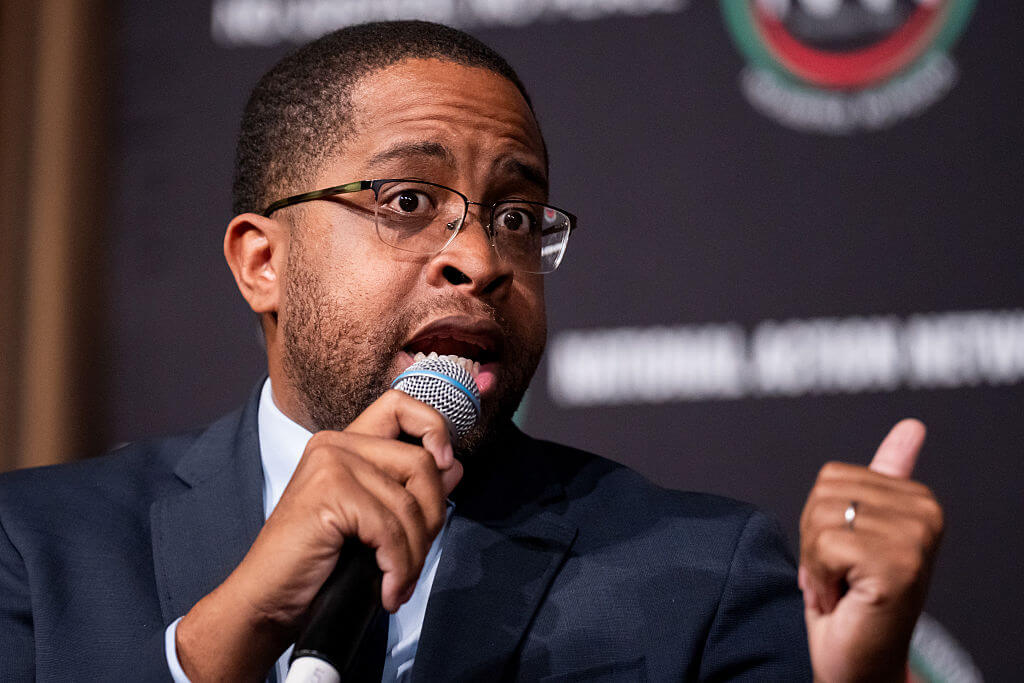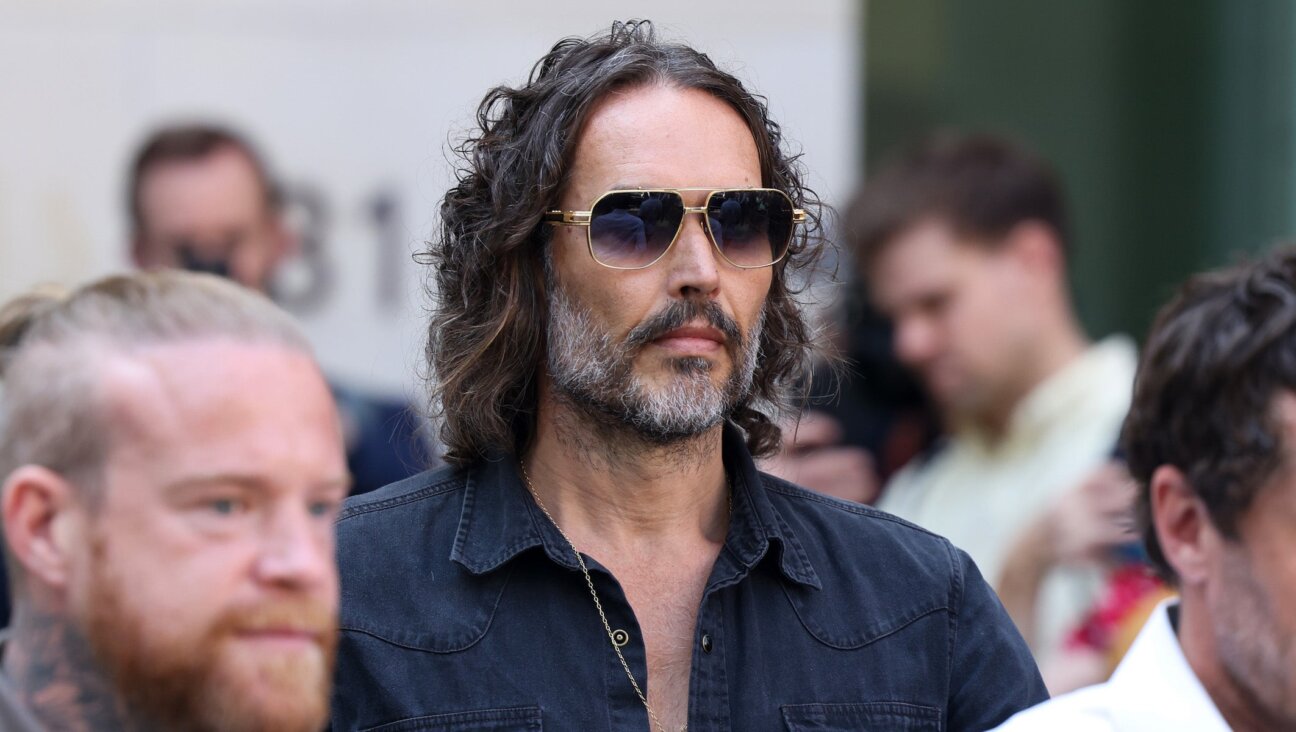Intermarriage 101: No Line in the Sand

Opening Up: In her interfaith marriage workshops Marion Usher prods couples to lay their identities on the table. Image by WASHINGTON JeWISH FILM FeSTIVAL
When sending the grandchildren holiday gifts, should we use Christmas or Hanukkah wrapping paper?

Outreach: A Washington program reaches out to interfaith couples such as Brad Cheney and Rebecca Geller, seen here with their baby. Image by WASHINGTON JEWISH FILM FESTIVAL
This real-life dilemma actually came up at one of the interfaith couple workshops conducted for the past 15 years at the Washington District of Columbia Jewish Community Center. With 450 couples that have already attended her workshops, and her first DVD and manual set for conducting interfaith couple meetings, Marion Usher, founder and moderator of the workshops, has heard almost every possible quandary a mixed-marriage couple could come up with. And dealing with grandparents who suddenly have to make decisions on wrapping paper is one of them.
Usher’s workshops don’t provide the answers to these and other questions; they try to give couples, many of them in the early stages of planning their joint lives, some tools for discussing differences and for understanding each other better.
Usher, a psychotherapist, gained an interest in the issue of interfaith couples because of her interest in Jewish life and in “why people draw lines in the sand and say who is in and who’s out.” Her approach seeks to erase that line in the sand in favor of inclusiveness.
But outreach efforts like this are still a matter of dispute within the community. While outreach to interfaith couples is broadly welcomed by the more liberal denominations, the Orthodox and some in the Conservative movement still emphasize marriage within the faith or only with conversion. These Jews resist inclusion of non-Jewish spouses in the community.
“Love and Religion: The Challenge of Interfaith Relationships” is a 54-minute instructional DVD that follows Usher’s four-session workshop. The film, with the printed manual that accompanies it, serves as a guide for instructors across the country who are seeking to run programs for intermarried couples. It debuts December 6 at the Washington Jewish Film Festival.

Opening Up: In her interfaith marriage workshops Marion Usher prods couples to lay their identities on the table. Image by WASHINGTON JeWISH FILM FeSTIVAL
The film follows a half-dozen couples as they go through the workshop, which at times serves as a support group for both partners — one struggling to keep a Jewish identity, the other wishing to maintain another faith and tradition.
“We had decided to raise our children Jewish, but I also wanted to make sure I don’t lose my identity along the way,” said Kimberly Frye, one of the participants, as the other couples nodded in understanding, “I wanted to make sure we are able to expose our children to both faiths.”
The session was filmed two years ago. Since then, Kimberly has married her then-boyfriend, Seth Kreger, and the two are expecting their first baby. “We have an ongoing dialogue on issues of faith,” Seth said in an interview. “The workshop taught us to be open and to communicate.”
Jacey Spratt, another participant, said she found the sessions to be “a safe place where we can have these discussions.” For Spratt, it was also about meeting other couples facing the same problems. “We came out understanding we are not alone; it creates a support group,” she said. Some of the couples that attended the sessions highlighted in the film have kept in touch and meet regularly for Sabbath dinners.
Similar programs are conducted in other communities, such as San Francisco’s Jewish Welcome Network. Karen Kushner, executive director of that program, said that many interfaith couples don’t even try to approach Judaism, since they think they’ll be turned away. “That is why programs like ours send a message that they have a place in the community. It creates an open door,” she said.
But Steven Bayme, director of contemporary Jewish life at the American Jewish Committee, believes that the open door must also be accompanied by a demand to encourage conversion. “There is definitely room for these programs, as they reflect a consensus in the community that intermarriage is a fact,” Bayme said, “but we should not, in the name of outreach, surrender the core teachings and beliefs of the community.”
Usher does not raise the idea of conversion in her workshops. Moreover, she emphasizes the importance of meeting the needs of the non-Jewish spouse and making family decisions in a cooperative manner. Still, she stressed in an interview at her Dupont Circle home, she would like to see the couples build households in which Judaism is the lead faith. “My goal is to have more Jewish children in the world,” she explained.
According to a survey of graduates of the program, this goal is being met. More than two-thirds of the couples who attended are raising their children Jewish. The rest define themselves as having households in which children are raised with both faiths.
These participants, of course, do not necessarily reflect the full picture of intermarried couples in the Jewish community. The data should be viewed as limited to those who already are open enough toward Judaism to choose to take the courses. Still, studies in Boston and San Francisco supported the idea that intermarried couples who are part of a community that pro-actively reaches out to them tend to have higher likelihood of raising Jewish children.
Usher also takes pride in the fact that some of her graduates decided to convert years after taking the class and establishing their marriage. Two of the women went on to be active in their community and are now in charge of the synagogue’s mikveh.
But maintaining Jewish identity in an interfaith marriage comes with a price for both partners, and dealing with this price tag is one of the workshop’s main themes.
“The couples who come to me share a sense of loss,” Usher said, “and as soon as people acknowledge their loss, we can move on.”
In the sessions, she draws from literature on couples therapy and stresses the need to respect and remain open to the other spouses’ views and concerns. The key, she said, is communicating and making both sides feel comfortable. “They come to these classes because they’re stuck and don’t have the terms and skills of creating religious life together,” Usher said.
The next stage of the program will be to set up groups across the country that will conduct similar programs based on the instructional DVD. The target audiences are Jewish communities in small cities where there is a lack of the elaborate Jewish communal institutions already running interfaith-education programs.
Contact Nathan Guttman at [email protected]
























